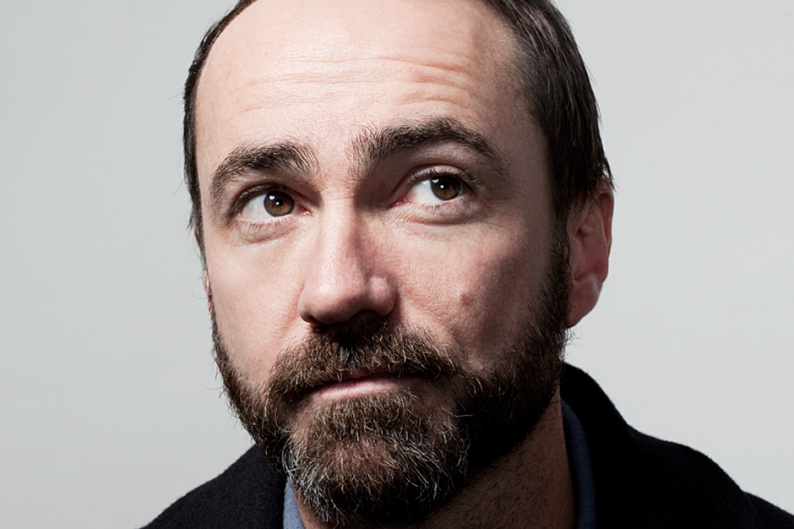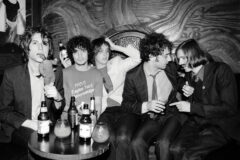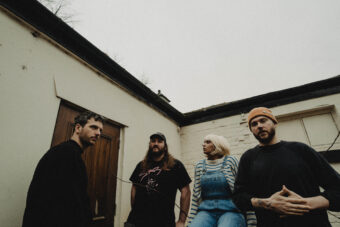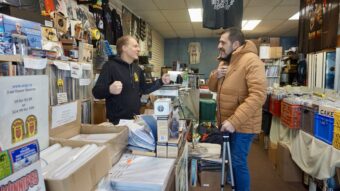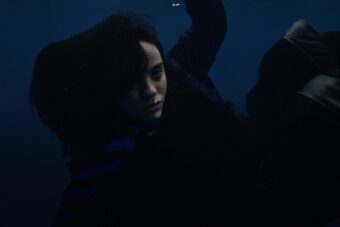“For the longest time, I didn’t even want to admit I was serious about music,” says James Mercer, sitting cross-legged on the floor of his home studio in Portland, Oregon, fiddling with one of the pedal and effects cords snarled around him. “Before the Shins, I would tell myself, ‘Oh, I’m going to figure something out someday. I had this romantic vision of being this old dude maybe making guitars or something.” Instead, over the course of the past decade, he formed a touring band to help interpret his jangly, cryptic pop-rock ruminations. And over the course of three increasingly rich, and increasingly absorbing, Shins albums (aided, yes, by an unlikely, much-deliberated goose from Natalie Portman), Mercer settled into permanent rotation on the iPods of seemingly every thirtysomething in America who happened to remotely resemble James Mercer.
In a few weeks, the 41-year-old musician will release Port of Morrow, the first new Shins record in five years, and the first since Mercer parted ways with his longtime bandmates in a move that many called a firing and he terms “an aesthetic decision.” It’s a brighter, poppier beast than previous ventures, filled with spacey ’70s keyboards and surprisingly straightforward lyrics. The soft-spoken military brat, who has lived every-where from England to Albuquerque, says Morrow may be an outgrowth of his collaborations with other musicians, including Broken Bells partner Brian Burton, a.k.a. Danger Mouse, and Port contributors Janet Weiss (Wild Flag) and Los Angeles–based producer Greg Kurstin (Lily Allen, Ke$ha).
Later today, he’ll be shooting a video for “Simple Song,” the first single off the new album, but right now he is tucked away in the turn-of-the-century carriage house he’s converted into a studio for his new label, Aural Apothecary, just behind the big Victorian house he shares with his wife, Marisa, and two young daughters. It smells like warm, old wood and books in here; the space is filled with curios and a huge, old set of library-card-catalog drawers alongside computer monitors and a Hammond organ. You get the feeling Mercer would happily stay here forever if he didn’t have video shoots, a second Broken Bells album, and a Shins world tour to attend to. But nobody ever said being an indie-rock elder statesman was a stay-at-home gig.
You’re the only original member left in the Shins. Why go back to that name, that “band” at all?
I always loved these auteurs who presented themselves as bands — Neutral Milk Hotel, the Lilys — and I just felt, “Why am I not allowed to do that?” And I love the concept of the Shins. I felt it could come along with me. This record was made with a cast of characters revolving around me, which I think is something I would have been afraid to do in the past. Working with Brian [Burton, on 2010’s self-titled Broken Bells album] got me over a lot of fears of collaborating with people and revealing just how flawed I am as a player and a writer. I realized I can do that stuff. I’m good enough. I don’t need to be so nervous. I don’t know why I was so shy. I was really shy as a kid. My good friend [and original Shins bandmate] Neal Langford had to pull me out of my room to get me to play in a band at all.
How old were you?
I was probably 21. We were called Subculture and I just played my guitar very quietly in the background. But it got me out of my shell and gave me a social life.
Later, you and Neal founded the band Flake Music together in Albuquerque. That’s where you started working on the Shins material, too, right?
Yeah. Albuquerque offers all sorts of cool things, like, the first Shins show was opening up for Cibo Matto. Bands need gas money, so they’ll play Albuquerque. They’re not bringing an opener, so the local yokels can play with these national bands.
People think the Shins have a Portland type of sound: literate, poppy, sorta folky. But where’s Albuquerque in your sound?
The fact that I’m often pushing my voice as hard as I can is from playing in nightclubs in Albuquerque where you don’t have a good sound system. You just have to try to beat out the guitars, amps, and drums. We weren’t very popular in Albuquerque. Anything really macho, really heavy, and aggressive is successful there.
So the Shins were in some ways a —
Total rebellion. The most punk-rock fucking thing I could do in my life was something like “New Slang.” That was just, like, flipping off the whole city. It’s definitely a moment in my life, that sort of angst and confusion about what my future was going to be. The Shins weren’t anything when I wrote that song. There wasn’t any hope for anything like a music career. It’s that end-of-your-20s thing. Before you knew it, my whole life was upside down: I got signed, I quit my job, I moved out of town, the big relationship I’d had for five years ended. All of a sudden my whole life was up in smoke.
And you didn’t stop.
It never stopped.
You were 31 when the Shins exploded in 2001. How do you think your age affected the choices you made?
I know the bleakness of dead-end job after dead-end job, and I finally knew this was my one thing, this is what I do well. So I was pragmatic — when one of my own bandmates would be mocking me to my face, I didn’t let it break up the band. We would talk and get on the same page somehow. A band takes more work than a 24-year-old is willing to put into it. At least me at 24, I’d have been like, “Fuck this.”
What were you doing at 24?
Working at a Shoney’s restaurant. Working at Michaels, the hobby store, in the framing department. Then I had a job where I worked at a factory that made Southwestern-type sconces. We did a billion Kokopelli guys.
At that point in your life, what was success to you?
Impressing Amy Linton [of the Aislers Set]. I wanted the coolest person in Albuquerque to think I was cool. She was in a band called Henry’s Dress that got signed and they moved to San Francisco, which I really resented them for. And she was just super cool. She’s still super cool.
Now who do you look to and say, “That’s the kind of career I want to have?”
I would like to be in a position where I didn’t have to tour or do [publicity] so much. Stephin Merritt seems to have done so much really solid work that he can make a living without having to be a star. When he feels like it would be enjoyable, he’ll play a show. My hope is that one day I’ll be able to work and have a quieter life, but still a creative life. Now you play shows, do interviews, and do your best to get on Saturday Night Live. And that’s great for the sales. I own the [Port of Morrow] master. I have to be thinking about the business end.
How does starting your own label, Aural Apothecary, and owning your masters change how you feel about the business side?
It feels good. It’s probably some sort of argument that Ron Paul would use for some bullshit thing — just the fact that I own it and I’m doing my best to get it out there makes you feel less exploited and more like you’re doing something for yourself and your family.
James Mercer for Ron Paul 2012.
No, I’m so not political. I do like talking with friends about big concepts, you know, the stuff that will ruin a party. To me, the party hasn’t begun until we’re talking about the nonexistence of God.
How do you think those “big concepts” play out in your music? Your lyrics are certainly critical of people selling a single idea of life.
The idea that someone would have the audacity to think they should enforce their convictions on another person is fascinating to me. Brian [Burton] actually pointed this out about me. He said, “You care so much about the truth that you overlook the fact that most people could not care less. They don’t give a shit about the truth.” I was kind of offended, but I realized pretty quickly that it was true. There’s no real reason for me to be so obsessed with trying to understand the true nature of things. You can live a perfectly happy life being utterly confused and not knowing.
How has fame helped or fucked up your process of making music?
When I sit out here and I pick up a guitar and I’m playing and trying to come up with melodies — when you’re not thinking about anything — that’s when the good stuff starts to happen. I’m hoping the outward stuff, the fame and all that, can’t affect that precise moment. What it can affect is your work ethic. Most people, if they’re my age and doing pop, are starting to get a little washed-up — maybe they get too confident. I feel like my insecurities are my best friends because they keep me critical of myself and what I’m doing. Hopefully, it stays healthy. Don’t do it if you’re not going to do it well. I could always go back to Michaels.
When did you finally start to believe that this band thing was for real?
After Oh, Inverted World, I realized I was starting to be able to have an income that was on par with the other 30-year-olds around me. I thought, “Whoa. Let’s maintain.” If we work hard and tour, we can actually have a proper life where you could get married and have kids. I remember being 15 or 16 [living in England] and thinking about who I wanted to be when I was 30. I pictured myself as one of those men you see on the Tube; somebody who has a proper job and wears a tie. I remember thinking I’d be some sort of young professional. That was the best I could hope for.
What were you listening to when you were a high school kid in England?
U2 were super cool when I moved over there. I loved the Cure. Echo and the Bunnymen. And I loved the Sex Pistols; I really got into them. My friends, we were always sharing mixtapes. A lot of punk bands — Circle Jerks and Black Flag. And the House of Love was a band on Creation Records that I really loved. Sonic Youth, the Jesus and Mary Chain… the shit that was cool back then.
All the things that would impress girls.
Not in my high school.
You didn’t date a lot back then?
I had one girlfriend in high school — Darla. I guess I had a two-week thing with a girl named Keiko, and she dumped me for a drummer, another Jamez. With a “Z.” He had a mustache. I was so bummed.
No wonder you don’t drum.
I do! I drummed on [Port of Morrow opener] “The Rifle’s Spiral.” I did the bulk of the drumming on that one. The cool rolls are Janet Weiss. She broke a stick on “Simple Song.” She’s just a monster. She’s so good.
She’s so feral.
I know. She hates those drums! She’s killing it.
You rattle off all those bands you loved, but now the Shins are a touchstone for another generation. You’re one of the band names that you pop in Pandora.
It’s so weird. There’s apparently a nightclub in London that has a “New Slang” night with indie folk/rock. That was one of those moments when I was like, “Whoa, that’s crazy.” But it’s interesting to hear you say that we’re an established band. It’s not a joke thing. It’s a legitimate band.
Yes, the Shins are legitimate. What else would have blown the 15-year-old James Mercer’s mind?
I met Johnny Marr [when he was playing guitar with Modest Mouse] at a backyard barbecue not far from here, with a fire pit and cheap beer. I did not recognize him at all. I recognized the Northern English accent. I didn’t know he was doing a mod look nowadays. I just have my Smiths records with pictures of him with a bouffant. I was like, I’m shaking Johnny Marr’s hand. And he was telling me about how [Modest Mouse] really loved Chutes Too Narrow, and they would listen to it when they were going back and forth from the studio with some other famous dude. That 15-year-old kid wouldn’t have believed it; it would’ve felt like, “You’re gonna be okay and you’re gonna win the fucking lottery. Not only are you not going to be a loser forever, but you’re going to actually have this
exciting and interesting life.”
Was it Isaac Brock’s backyard?
It was [Modest Mouse and current Shins drummer] Joe Plummer’s house. But Isaac probably showed up at some point and danced in the fire.
That’s so Portland. Is that even kosher to say anymore, since Portlandia?
I think it is. It’s partly because of what used to be a big part of the economy: drunken sailors spending ridiculous cash on fun and debauchery. Music is always so closely related to all the vices. If you’re going to be in a band, you’re going to be exposed to everything you’re not supposed to ever hear about in church. So, all the bars and nightclubs combined with the fact that Portland’s a relatively inexpensive place to live means there’s the right seeds to have a kick-ass music scene.
In 2009, you went from playing with a group of people you had worked with for more than a decade to collaborating with Danger Mouse to scoring documentaries to starring in a movie [Portland director Matt McCormick’s Some Days Are Better Than Others].
You know what was really a moment for me? And I don’t want to sound pretentious or weird about this — I was asked to go perform a song at Heath Ledger’s memorial service in L.A. [in 2008]. Heath was a really nice guy and a charismatic person. He influenced the people around him and was so engaged with them and had such deep relationships. He was the opposite of me. I felt like I was a ghost when I left. The outpouring of emotion for him was so moving. It scared me and it changed me. I felt like Scrooge after he’s exposed to what his life could be if he continued on his way. So, the first thing I did afterwards was this trip I had been offered to travel down to Chile and play music with this documentary crew. I said yes, which I would’ve never done. And then it was yes to Brian. I started saying yes when people offered new experiences. I was just like, “I’ve gotta fucking change.”
Was that before you stopped working with [ex-Shins] Dave Hernandez, Marty Crandall, and Jesse Sandoval?
Yes. It was tremendously difficult. I don’t like disappointing people, so it was just excruciating, but I felt I needed to do it. I don’t want people to think of me as a jerk or inconsiderate of those good people’s feelings or their future. Both Dave and Marty play on Port of Morrow. And I will probably work with Jesse and Neal [Langford] again, recording and touring live. I try not to think about it as a firing as much as a new phase in the process. I’m telling you, there are things those guys can do that no one else can do. If a song needs them, that’s what it’s gotta have, if they’re willing.
There’s lightness to Port of Morrow; that’s a new thing for the Shins.
The exuberant side would be “Simple Song.” The more wry, confident side would be “The Rifle’s Spiral,” where I just feel comfortable spittin’ it.
Is it true you had a family from Japan stay with you after the tsunami?
They stayed with us for more than a month: two kids and a mom from north of Tokyo. It was through our daughter’s Montessori school. The idea was that there were people who just needed to get out of Japan for the summer. We’re just in love with them. We took ’em all over — to the coast, to the zoo. And Marisa learned a lot about Japanese cooking. Now we’re pen pals.
Did they have any idea of who you were?
Nope. By the very end, a friend of the mom’s figured it out and explained it to her. She looked me up on the Internet and said, “Oh, you’re a singer.”
What other projects are you working on? Any more acting? A book?
No. I made a bird’s nest. A giant bird’s nest for my daughters. [He points out the studio window to a big, UFO-looking object in his backyard.] It’s so easy. And it kind of makes you excited about pruning the trees because it’s like, “Oh yeah! More shit to put in the bird’s nest!” And it just keeps getting better and better.

